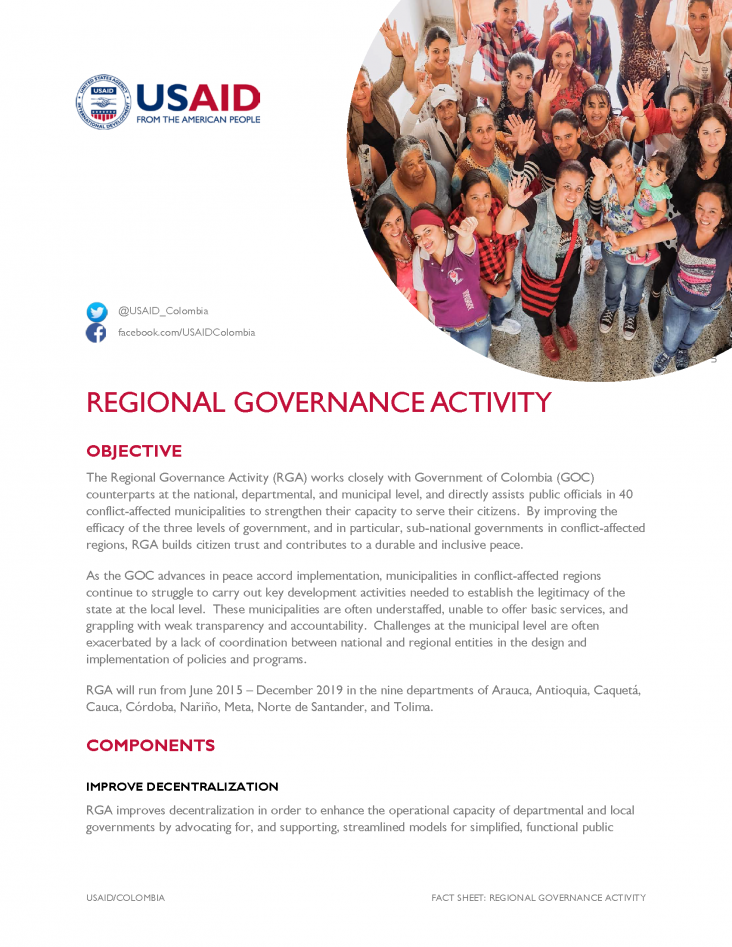Speeches Shim

OBJECTIVE
The Regional Governance Activity (RGA) works closely with Government of Colombia (GOC) counterparts at the national, departmental, and municipal level, and directly assists public officials in 40 conflict-affected municipalities to strengthen their capacity to serve their citizens. By improving the efficacy of the three levels of government, and in particular, sub-national governments in conflict-affected regions, RGA builds citizen trust and contributes to a durable and inclusive peace.
As the GOC advances in peace accord implementation, municipalities in conflict-affected regions continue to struggle to carry out key development activities needed to establish the legitimacy of the state at the local level. These municipalities are often understaffed, unable to offer basic services, and grappling with weak transparency and accountability. Challenges at the municipal level are often exacerbated by a lack of coordination between national and regional entities in the design and implementation of policies and programs.
RGA will run from June 2015 – December 2019 in the nine departments of Arauca, Antioquia, Caquetá, Cauca, Córdoba, Nariño, Meta, Norte de Santander, and Tolima.
COMPONENTS
Improve Decentralization
RGA improves decentralization in order to enhance the operational capacity of departmental and local governments by advocating for, and supporting, streamlined models for simplified, functional public policies. RGA also strengthens the capacity of civil society to push forward discussions on decentralization.
Improve Financial Management
RGA improves the capacity of targeted municipalities to deliver efficient and effective public services by strengthening public financial management capacities of the 40 municipalities of the program.
Improve Secondary and Tertiary Road Infrastructure
RGA improves the normative, institutional, and procedural frameworks for the development and maintenance of secondary and tertiary road infrastructure. The activity also supports the development of community-based associations for the improvement and maintenance of rural roads.
Improve Electoral Process
RGA assists the GOC in its efforts to prevent, investigate, and prosecute electoral crimes and electoral corruption by strengthening the capacity of key GOC institutions. RGA also works to improve institutional coordination among GOC institutions.
Increase Citizen Participation
RGA increases citizen participation for enhanced transparency and accountability. It provides technical assistance to civil society to demand more information on public financial management and supports social control of public management and investment.
RESULTS
- Supported five key actors in the development of a reform proposal that resulted in an increase of $118.3 million in new income for sub-national governments in 2017, and $226 million annually from 2018 onwards.
- Supported participatory and inclusive processes for drafting regional development plans with an emphasis on adaptability and peace-related activities in seven departments and 40 municipalities.
- Supported the GOC in the design of the model to implement the ZOMAC (zones most affected by the conflict) and Tax Deduction Schemes for Public Works (Obras por Impuestos).
- Reactivated and strengthened 40 territorial planning councils, which allows citizens to come together and participate in the drafting and oversight of municipal development plans.
- Supported the creation of 130 citizen oversight committees, which are groups of citizens that voluntarily take trainings to learn how to oversee public works.
- Assisted in the development of a new model for the criminal investigation of electoral crimes, providing input for 22 potential investigations, with six investigations currently underway.

Comment
Make a general inquiry or suggest an improvement.